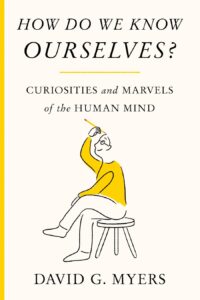
Spare Me the Humblebrag: David G. Myers on the Virtues of Humility
“Where there is humility, there is the possibility of forgiveness.”
In today’s contentious and polarized world, we struggle to reconcile the virtues of conviction and humility.
Our convictions define what matters to us. We anchor ourselves in core beliefs and values that guide our lives. Our convictions motivate our advocacy for a better world. They give us courage to speak and act. “We must always take sides,” said the Holocaust survivor Elie Wiesel. “Silence encourages the tormentor, never the tormented.” “To be silent is to be complicit,” added Sister Helen Prejean in her 1993 book, Dead Man Walking.
We need deep-rooted convictions to fuel our passions. But in our age—in which, for example, the percentage of both Republicans and Democrats who “hate” the other party has soared from 20 percent in 2000 to near 50 percent in 2016—we need humility even more. Conviction abounds, but humility is in short supply.
Intellectual humility—knowing that one might be wrong—restrains bullheaded fanaticism. Humility enables civil discourse. Humility underlies science. Humility facilitates critical thinking, which puts testable ideas—including one’s own—to the test. Nullius in verba (Britain’s Royal Society motto): Take nobody’s word for it. To accept everything is to be gullible; to deny everything is to be a cynic.
With a spirit of humility we can engage others with the anticipation that, on some matters, the other is our superior—thus giving us an opportunity to learn.
Humility also supports healthy relationships. Humility’s opposite is pride, which so often feeds contempt for others. Even Dale Carnegie, America’s twentieth-century positive thinking apostle, foresaw the danger: “Each nation feels superior to other nations. That breeds patriotism—and wars.”
Psychology has long explored the powers and perils of pride. We have documented the following:
Self-serving bias. We tend, as we’ve noted, to see ourselves as better than most others. And we willingly accept responsibility for our successes and good deeds while shifting the blame elsewhere for our failures and misdeeds.
Cognitive conceit. We tend to display excessive confidence in the accuracy of our judgments and beliefs.
Unrealistic optimism. University students perceive themselves as much more likely than their peers to get a good job, own a house, and draw a good salary, and as much less likely to develop an alcohol problem, get fired, or suffer a heart attack by middle age. Newlyweds think themselves immune to the fate of 40 percent of marriages—divorce.
Humility, by contrast, entails an accurate understanding of self. To paraphrase C. S. Lewis, true humility is not thinking we are less than others, but rather allows us to recognize both our own talents and others’ strengths. Humility also involves modest self-presentation. When we share and accept credit without seeking attention, we are not (to again paraphrase C. S. Lewis) thinking less of ourselves but thinking of ourselves less.
Last, when we are humble, we have an orientation toward others. Prioritizing others’ needs helps us regulate our own impulses. With a spirit of humility we can engage others with the anticipation that, on some matters, the other is our superior—thus giving us an opportunity to learn.
True humility can be distinguished from pseudo-humility, which comes to us in two forms. One is the pretense of humility. Someone who says “I am humbled to accept this award… to serve as your president… to have scored the winning goal” is actually proud of their accomplishment—and deservedly so.
The other form was demonstrated by Ovul Sezer, Francesca Gino, and Michael Norton in their research on the humblebrag. Humblebragging is boasting disguised as complaining or humility: “I’ve got to stop saying yes to every interview request.” “I can’t believe I was the one who got the job over three hundred other applicants!” “No makeup and I still get hit on!” But such self-promotion usually backfires, they report. People often see through the humblebrag. It comes across as insincere and fails to elicit sympathy, convey humility, or impress others.
Intellectual humility—knowing that one might be wrong— restrains bullheaded fanaticism.
Other psychological studies confirm that good lives and healthy cultures are animated by convictions that are refined by humility. Humility is pro-social. It opens us to others, enriches our understandings, and builds bridges across our divides. Show social psychologists a situation where humility abounds—with accurate self-awareness plus modest self-presentation plus a focus on others—and they will show you friendship bonds and happy marriages. Where there is humility, there is the possibility of forgiveness, of smooth group relationships, and of acceptance of diversity.
Humility is also strategic. As I write these essays, I confess to savoring my own words—to taking joy in creating the flow of ideas, playing with the phrasing, fine-tuning the product to seeming perfection. This time, I have repeatedly told myself, my editors will find nothing to improve upon. But always they find glitches, holes, ambiguities, or infelicities to which I was blind.
Perhaps that is your story, too? Your best work, when reviewed by others…your best tentative decisions, when assessed by your peers…your best plans, when critiqued by consultants…turn into something better than you, working solo, could have created. Humility works. The pack is greater than the wolf.
Of course, there is an irony to self-assessed humility, which can lead us to feel proud of our better-than-average humility, as in Donald Trump’s tweet: “The new Pope is a humble man, very much like me, which probably explains why I like him so much!”
“True humility does not know that it is humble,” observed Martin Luther. “If it did, it would be proud from the contemplation of so fine a future.”
So, how can we deepen our humility? C. S. Lewis had an idea: “If anyone would like to acquire humility, I can, I think, tell him the first step. The first step is to realize that one is proud. And a biggish step, too.” And the second step, continued Lewis (foretelling psychological research to come), is to compare upward. Compare yourself with those wiser, shrewder, or stronger, rather than with those less so. The ultimate upward comparison, he added, is to glimpse the greatness of God and to see oneself in light of that—enabling you to “be humble, delightedly humble, feeling the infinite relief” of having let go of the pretensions that have “made you restless and unhappy.”
__________________________________

Excerpted from How Do We Know Ourselves?: Curiosities and Marvels of the Human Mind by David G. Myers. Copyright © 2022. Available from Farrar, Straus and Giroux, an imprint of Macmillan, Inc.
David G. Myers
David G. Myers is a social psychologist and professor of psychology at Hope College. His articles have appeared in dozens of scientific periodicals and magazines, from Science to Scientific American. He is also the author of more than fifteen books, including psychology’s most widely read textbook, which has sold more than eight million copies worldwide, and general interest books including Intuition: Its Powers and Perils. Myers resides in Holland, Michigan.


















